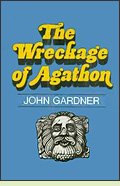|
The Wreckage of Agathonby John GardnerReviewed by David Maclaine
It’s anything but incidental that The Wreckage of Agathon is set in the age when the Spartans were first becoming what we now call Spartan. The extremes of self-denial in the name of duty that came to represent the Spartan character have fascinated many an outside observer. Gardner's great accomplishment is to provide a comical critique of the system, including a vivid defense of the virtues the Spartans rejected: the free play of the mind, the pleasures of friendship, and the abiding value of love. The Wreckage of Agathon is an intrinsically interesting dark comedy that matches absurd humor with deep-felt tears, an artful story-line and vivid characters. It also gives proper attention to the Spartans' subject race, the helots, whose doomed struggle is at the heart of the story. Before you immerse yourself in a more sympathetic treatment of Spartan life it's only fair to keep Gardner's take on the Spartans in mind. (1970; 243 pages) More about The Wreckage of Agathon at Powell's Books, Amazon.com The Wreckage of Agathon appears on the list of The 36 Best Historical Novels for a Survey of Ancient Greek History Gates of Fire by Steven Pressfield (1998), about the suicidal Spartan effort to hold the pass at Thermopylae against a much larger Persian army in 480 B.C. See review or more info at Powell's Books The End of Sparta by Victor Davis Hanson (2011), about a farmer who serves in the Theban army under Epaminondas during the Battle of Leuktra. More info The Isle of Stone by Nicholas Nicastro (2005), about two Spartan brothers who, despite their testy relationship, must fight alongside each other during the Peloponnesian War between Sparta and Athens. See review or more info at Amazon.com
Plutarch's Lives by Plutarch (first century A.D.), pairs of biographical sketches of notable Greeks and Romans, which includes a life of Lycurgus (#3). More info at Powell's Books or read the Life of Lycurgus online at the University of Chicago website. Spartans: A New History by Nigel M. Kennell (2009), a scholarly history of ancient Sparta, which includes biographical sketches of its most important historical figures. More info The Warrior Ethos by Steven Pressfield (2011), reflections on the history of warfare by an author who specializes in novels about ancient warfare; an opening section briefly discusses Lycurgus and his impact on the Spartan warrior ethos. More info
300, the gore-soaked, digitally enhanced 2007 movie about the Battle of Thermopylae, directed by Zack Snyder.
Lycurgus of Sparta at Wikipedia
Back to Novels of Ancient History
|
